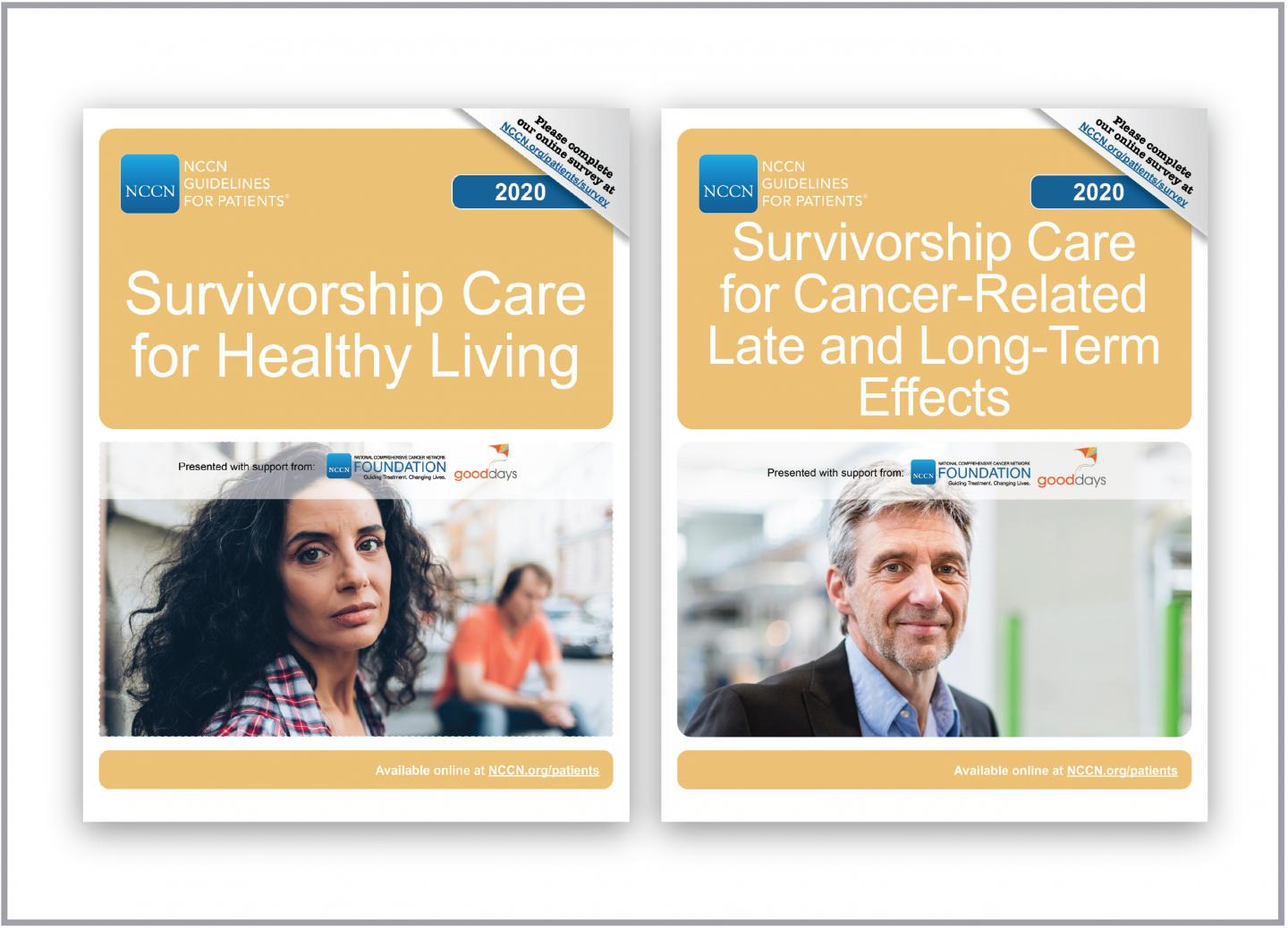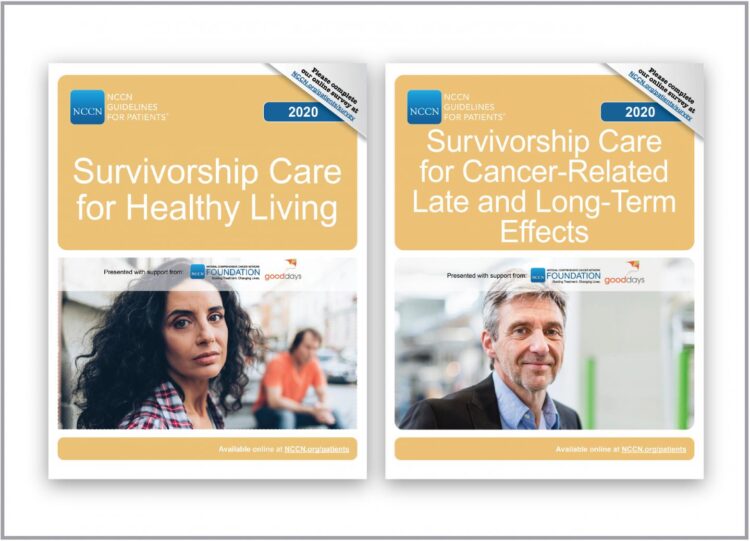New NCCN guidelines for patients: Survivorship series provides expert advice to help cancer survivors sustain better health while monitoring for any long-term side effects or recurrences

NCCN Guidelines for Patients: Survivorship series available at NCCN.org/patients
view more
PLYMOUTH MEETING, PA [January 5, 2021] — Today, the National Comprehensive Cancer Network® (NCCN®) announced the publication of new, free informational resources on health and wellness for cancer survivors. These two new NCCN Guidelines for Patients® are focused on healthy living and managing late and long-term side effects, and include appropriate ongoing screening for recurrence. The books are available for free to view and print at NCCN.org/patients or via the NCCN Patient Guides for Cancer App, thanks to funding via the NCCN Foundation® and sponsorship by Good Days. The books Survivorship Care for Healthy Living and Survivorship Care for Cancer-Related Late and Long-Term Effects provide jargon-free roadmaps for what comes next after initial cancer diagnosis and therapy.
“Getting a cancer diagnosis is scary. Surviving cancer can be even more scary,” said Ethan Zohn, 2x Cancer Survivor and Stem Cell Transplant Recipient, Winner of SURVIVOR Africa & Social Entrepreneur (@EthanZohn on Twitter and Instagram). “There are loads of uncertainty and invisible scars that need healing. That’s why I work tremendously hard to maintain my mental, physical and spiritual health in survivorship. Surrounding myself with family and friends, exercising, and getting out in nature has helped create balance in my life.”
“Just because initial therapy is over, doesn’t mean that it’s done,” explained Crystal Denlinger, MD, FACP, Fox Chase Cancer Center, Chair of the NCCN Guidelines® Panel for Survivorship. “Treatment may end, but fatigue, neuropathy, and other effects can linger. For some, cancer survivorship means long-term management as they continue to live with and through disease. These guidelines are applicable for survivors who are disease free as well as those living with cancer. They are far reaching across all cancer types, genders, and ages.”
“These guidelines include information on healthy living after a health crisis; which are good recommendations even for people who’ve never been diagnosed with cancer,” added Tara Sanft, MD, Yale Cancer Center/Smilow Cancer Hospital, Vice-Chair of the NCCN Guidelines Panel for Survivorship. “We want everyone to make a realistic plan to start moving more. It sounds simple, but we have really good data that exercise can reduce recurrence, even in people who didn’t exercise before diagnosis. It’s never too late.”
The guidelines pay heightened attention to mitigating risks of cardiovascular disease. There is also information for primary care providers to appropriately advise survivors, in collaboration with oncologists, to help them stay up-to-date on evolving screening recommendations.
Drs. Denlinger and Sanft stress that good survivorship care doesn’t have to wait until remission; in fact, they advocate taking care of the whole person beginning at diagnosis. They point out that preventive strategies include vaccination and appropriate screening as well as health behaviors.
“We know people do better overall when they’re healthier,” said Dr. Sanft. “We can improve longevity by addressing all of the factors that lead to poorer health and taking steps now to reduce long-term effects from treatment.”
This position is echoed in the NCCN Clinical Practice Guidelines in Oncology® (NCCN Guidelines®) for Survivorship, the trusted evidence- and expert-consensus based clinical practice guidelines that serve as the blueprint for these new patient guides. NCCN recognizes that the population of cancer survivors is growing rapidly, due to both an increase in diagnoses, and improving care methods that keep more people alive for longer. This is resulting in a greater need for research into long-term effects from traditional and emerging therapies, with the latter including immune checkpoint inhibitors and chimeric antigen receptor (CAR) T-cell therapy (side-effects from both immunotherapy types are covered in recently-published NCCN Guidelines for Patients).
There are now more than fifty different books for patients and caregivers from NCCN covering every major type of cancer, along with topics like managing cancer-related distress, nausea and vomiting, and special considerations for adolescents and young adults across all cancer types. Printed versions are available for a nominal fee at Amazon.com in addition to the free digital versions at NCCN.org/patients.
NCCN also just released new books for patients and caregivers on bone cancer and primary central nervous system (CNS) lymphoma. The NCCN Guidelines for Patients: Bone Cancer focuses on tumors that start in the bone or cartilage. The book includes treatment recommendations for chondrosarcoma, chordoma, Ewing sarcoma, giant cell tumor of the bone, and osteosarcoma. The NCCN Guidelines for Patients: Primary CNS Lymphoma offers expert diagnosis and treatment information for this uncommon and aggressive form of non-Hodgkin lymphoma that can start in the brain, spinal cord, eyes, or surrounding tissue.
Learn more and help support these and other resources for people with cancer and their caregivers at NCCN.org/patients.
###
About the National Comprehensive Cancer Network
The National Comprehensive Cancer Network® (NCCN®) is a not-for-profit alliance of leading cancer centers devoted to patient care, research, and education. NCCN is dedicated to improving and facilitating quality, effective, efficient, and accessible cancer care so patients can live better lives. The NCCN Clinical Practice Guidelines in Oncology (NCCN Guidelines®) provide transparent, evidence-based, expert consensus recommendations for cancer treatment, prevention, and supportive services; they are the recognized standard for clinical direction and policy in cancer management and the most thorough and frequently-updated clinical practice guidelines available in any area of medicine. The NCCN Guidelines for Patients® provide expert cancer treatment information to inform and empower patients and caregivers, through support from the NCCN Foundation®. NCCN also advances continuing education, global initiatives, policy, and research collaboration and publication in oncology. Visit NCCN.org for more information and follow NCCN on Facebook @NCCNorg, Instagram @NCCNorg, and Twitter @NCCN.
About the NCCN Foundation
The NCCN Foundation® was founded by the National Comprehensive Cancer Network® (NCCN®) to empower people with cancer and advance oncology innovation. The NCCN Foundation empowers people with cancer and their caregivers by delivering unbiased expert guidance from the world’s leading cancer experts through the library of NCCN Guidelines for Patients® and other patient education resources. The NCCN Foundation is also committed to advancing cancer treatment by funding the nation’s promising young investigators at the forefront of cancer research. For more information about the NCCN Foundation, visit NCCN.org/patients.
Media Contact
Rachel Darwin
[email protected]
Original Source
https:/





